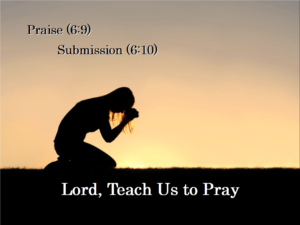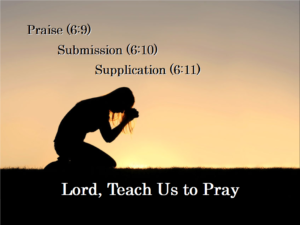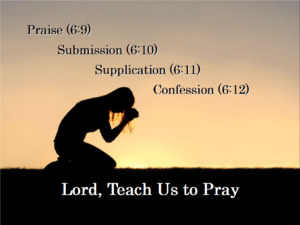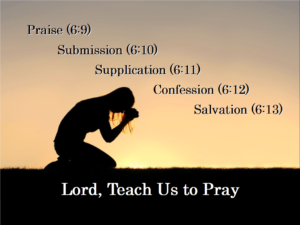Lord, Teach Us to Pray
Matthew 6:5-15
In Jesus’ teachings on prayer in the Sermon on the Mount, He teaches that:
We must not pray to be seen.
Our words do not need to be super eloquent and ornate.
We must not pray with vain repetitions – easy to do.
Pray in secret, not to be glorified by men but by God.
This prompts the disciples to ask Jesus how to pray, recorded by Luke (11:1).
It is difficult to know how to pray.
The public prayers said by the so-called holy men were bad examples.
So “teach us to pray.”
If we pray this exact prayer, are we not guilty of vain repetitions?
Jesus does not say to pray this prayer, but to pray “in this manner.”
It is broken down by verse: Praise, Submission, Supplication, Confession, Salvation.
Body.
In our prayers, we must always recognize the One to whom we pray.
We pray to the Father, the First Person of the Godhead (John 4:23-24).
He is high above us in every way (Psa. 8:1).
He is worthy of our praise and honor (Rev. 4:11).
He is our Creator and Savior (Gen. 1:1; 1 Tim. 1:1 – “by the commandment of God our Savior”).
In this country, we are not accustomed to royalty, to people having a higher station.
Here, anyone (ideally) could run for public office and get elected.
In ancient cultures (and in some modern ones), much deference is paid to the ruling class.
While such deference need not be made in America today , it ought to be given to our Lord.
Hallowed be His name!
Some say we shouldn’t say, “Your kingdom come,” because the kingdom has already come—maybe so.
Ultimately what this verse is expressing is an attitude of submission to God’s will.
In heaven, God’s will is performed flawlessly.
We ought to pray that His will be followed here on earth as well. Why?
Because He loves His children.
Because He knows what’s best for us—we don’t always.
Because every good and perfect gift comes from Him (James 1:17).
Because His ways are higher and better than ours (Isa. 55:9).
This is a request for our daily needs.
This follows with Christ’s statements later that we should not worry about tomorrow (6:34).
It allows us to focus on today’s needs instead of some future thing.
“Tomorrow will worry about its own things.” – focus more on that in a few weeks.
For now, pray for what is needed today.
Does not mean we should not pray for tomorrow.
Our focus should be on today.
We are not perfect beings—we sin more some days than others.
We must always be cognizant of this, and ask for forgiveness.
Simon the sorcerer had to repent of his sin and pray that his sin be forgiven (Acts 8:22).
This is no different for us, as we are also to confess them so they can be forgiven (1 John 1:9).
Because we are not perfect beings, we must recognize that nobody is.
We ought to forgive those who have wronged us.
It is easy for us to forgive our own sins, but not that of other people.
It is easier to forgive sins of people we know and like rather than others.
Jesus states it clearly that we must forgive others if we expect God to forgive us (6:14-15).
Our salvation depends on forgiving others!
We are tempted every day by the devil who wants to see us fail.
We pray not only for forgiveness, but for deliverance from the temptations that lead us to sin and death (James 1:14-15; 2 Pet. 2:9).
We know that He is faithful to provide a way of escape every time (1 Cor. 10:13).
This will help us as we journey toward our heavenly home.
Conclusion.
Jesus ends this model prayer with a line that is not in every Bible, but is true nonetheless, and is a great way to end our prayers and this lesson (called “doxology”).
We pray to Him because He is our God.
He has dominion and power over all things.
This makes our prayers effective.
While we have our part in prayer (“effective, fervent prayer of the righteous” Jms 5:16), but without an omniscient, omnipotent, and loving God, our prayers are useless.
He closes it with an “Amen.”
This word is transliterated from Hebrew.
It means “faithful, truly, so be it.”
It is an expression of agreement with what has been spoken.
When we pray, let us keep and follow the model Christ has given to us: Praise, Submission, Supplication, Confession, Salvation.
There are all different kinds of prayers.
Keep this outline in mind when you pray, touching on each thing.
Truth is prayer is not effective if you are not righteous, which means you must be a Christian first ….





